Riders Call For Fair Fares Instead Of A Fare Hike Ahead Of MTA Public Hearing
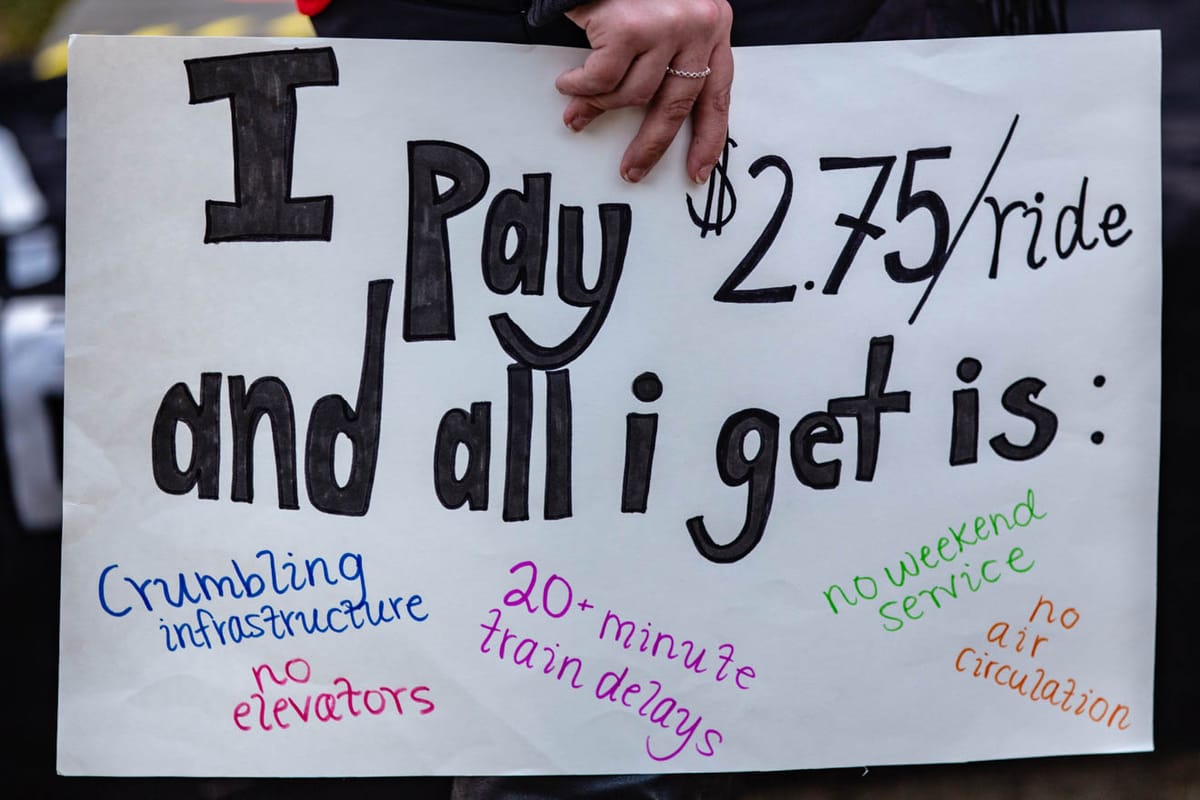
DOWNTOWN BROOKLYN – Transit riders, elected officials, and members of the #FixTheSubway Coalition rallied Monday afternoon, December 10, to oppose the MTA’s proposed fare hike and call on Governor Cuomo to develop a “fair and sustainable transit funding plan” which includes congestion pricing.
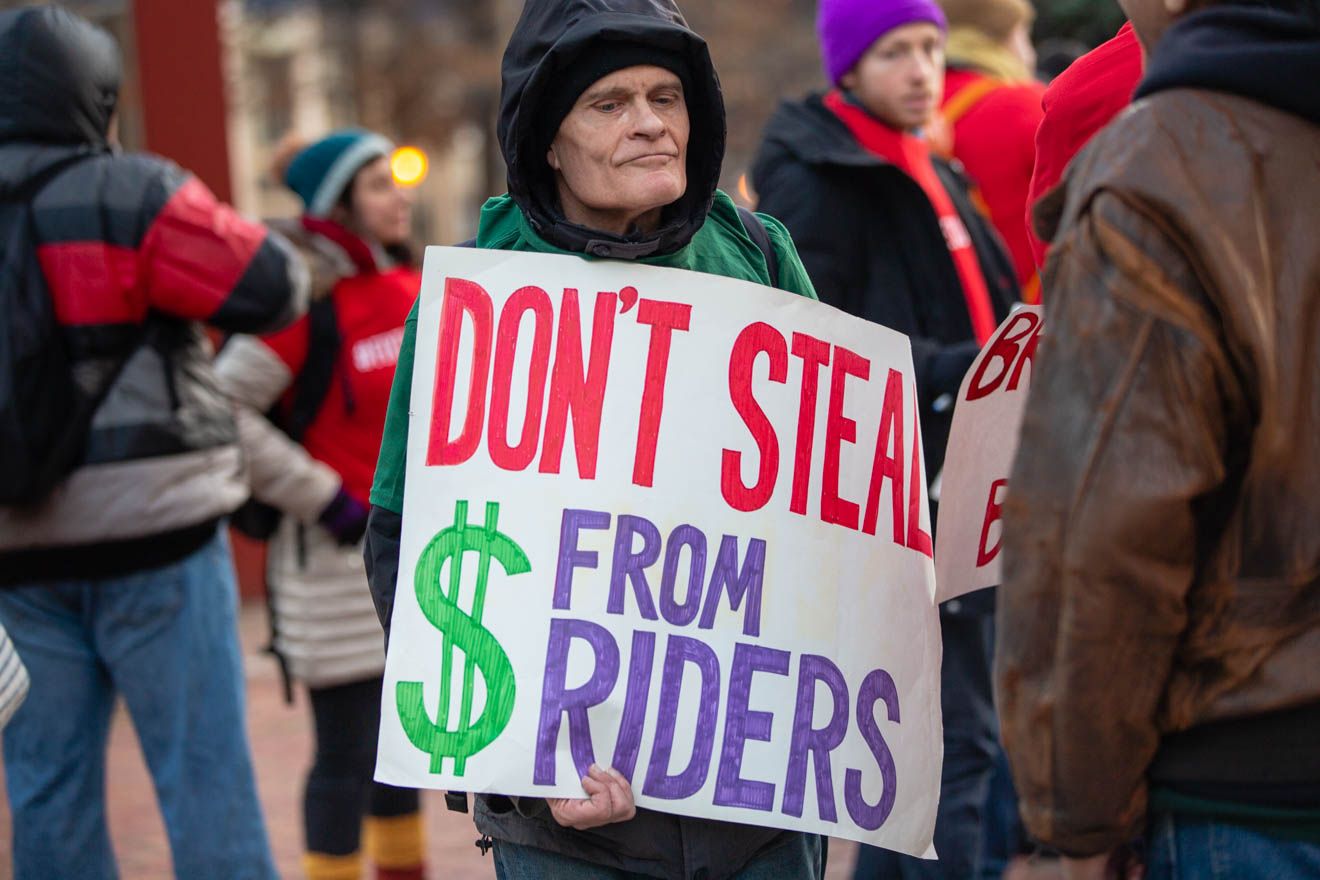
The rally took place in front of Long Island University’s Kumble Theater for the Performing Arts, just before the MTA’s Brooklyn Public Hearing on the proposed fare and toll hikes. Monday’s hearing was the sixth of eight such public meetings addressing the MTA’s proposed changes. Similar hearings were previously held in Manhattan, Bronx, Long Island, Staten Island, and Westchester to give the public a chance to voice their opinions on the planned price increases.
The MTA is proposing two subway/bus/Access-A-Ride fare increases in order to repair the aging system. One option would keep the base fare at $2.75 but would do away with the current 5-percent MetroCard bonus (given with a minimum $5.50 purchase). A monthly MetroCard would increase from $121 to $127.
The second option would raise the base fare to $3 but increase the MetroCard bonus to 10 percent (given with a minimum $6 purchase). Prices for a monthly MetroCard would go up to $126.25 with this option.
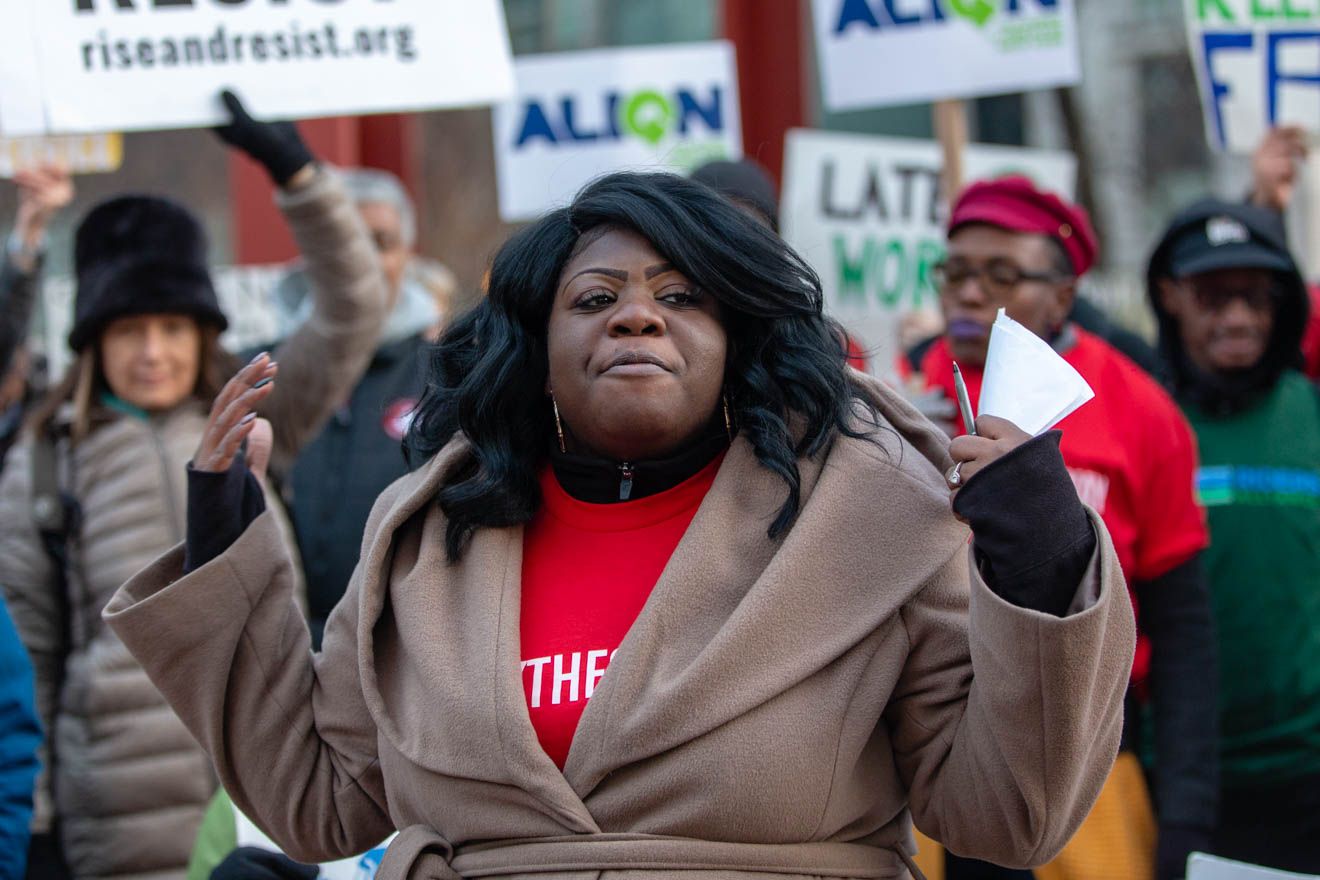
“We’re here tonight to demand that Governor Andrew Cuomo and the state legislature in Albany fix our subway by dedicating a revenue source to the state budget next year and we want to start with congestion pricing,” Danna Dennis, a Community Organizer for Riders Alliance said at the start of the rally. “Riders need a funding source. They don’t need a fare hike and that’s what we’re here to demand tonight.”
Dennis was joined at the rally by Assembly Member Jo Anne Simon, Council Member Mark Treyger, and representatives of various progressive, grassroots organizations that make up the #FixTheSubway Coalition including African Communities Together, ALIGN NY, Chinese-American Planning Council, Citizen Action, Community Voices Heard, Environmental Advocates of New York, the Legal Aid Society, Make the Road New York, New York City Environmental Justice Alliance, New York Communities for Change, New York Immigration Coalition, Red Hook Initiative, Riders Alliance, Rise and Resist, NYPIRG Straphangers Campaign, Street Vendor Project, Transportation Alternatives, UPROSE, and more.
“Congestion pricing is a charge on cars that would come into the central business district,” explained Rebecca Bailin of Riders Alliance. “It could raise up to one to two billion dollars every year depending on how robust the plan is.”

She added that organizers of the rally want to urge state lawmakers to include congestion pricing in any transit funding package since it “raises the most money every year out of any proposal.” Congestion pricing would also decrease the number of cars entering the city and “reduce congestion, as the name says, meaning buses can move faster.” The #FixTheSubway Coalition hopes that lawmakers in Albany will commit to a funding plan that includes congestion pricing as well as additional “progressive, fair, sustainable revenue source[s].”
“This is one of the most impactful issues we have in New York,” said Assembly Member Jo Anne Simon. “The subway and the public transit system is the life’s blood of New York City. It is how people get around. It is, for the most part still, the quickest way from here to there, except when you’re stuck in a tunnel. The problem is of course, people are stuck in a tunnel more often than not today.”
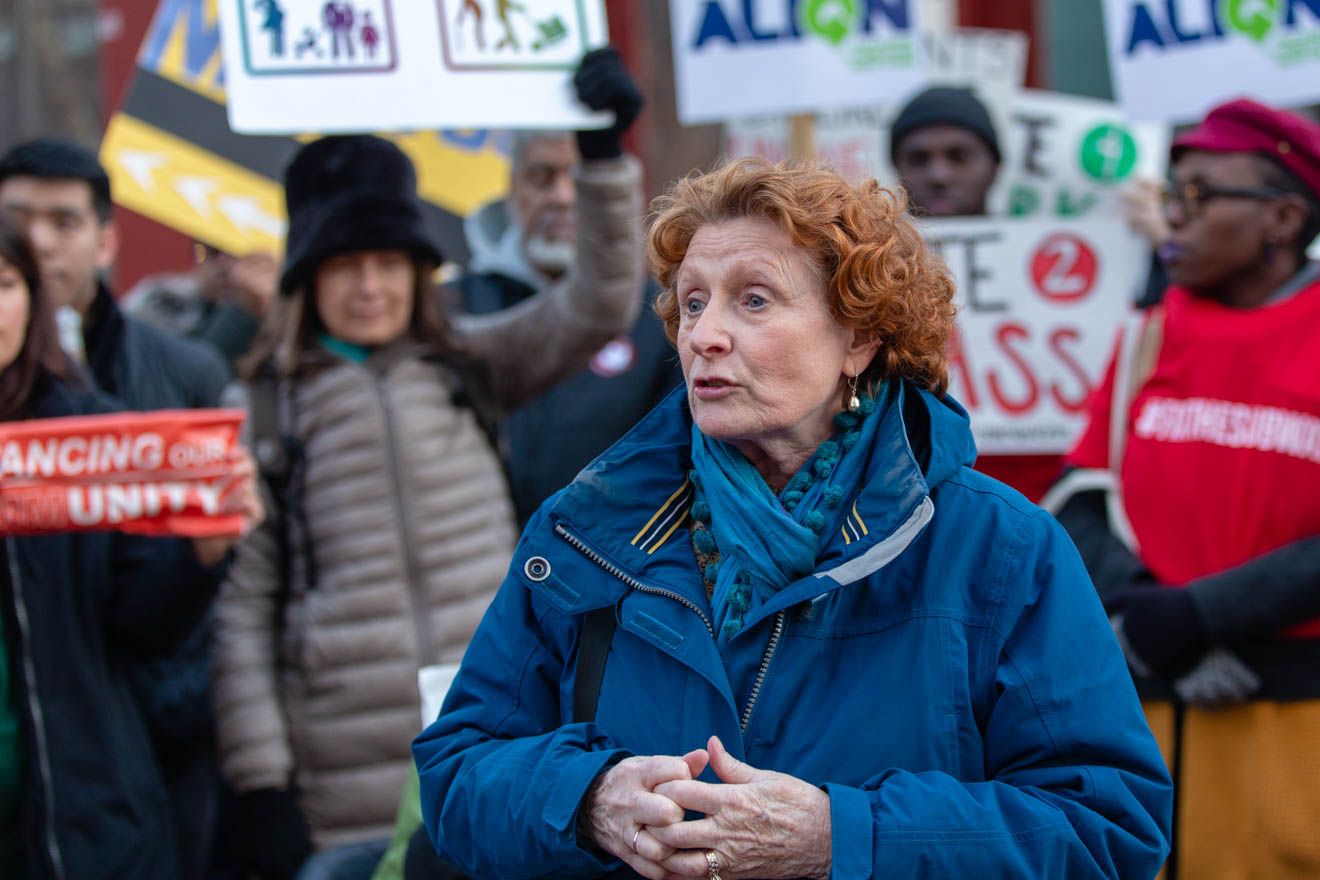
“Years ago Governor Pataki wanted to look like he was saving money so he cut the subsidy to the MTA and forced it to go out into the market and borrow at higher rates and that set up a long-term debt problem,” Simon continued. “We need to fix our subways and we need to find a way to fund it. The way that will actually get us the most bang for our buck and the most flexibility in funding the capital plan for the New York City Transit is congestion pricing.”
“We have a simultaneous crisis both in terms of transit and affordability, the likes of which we have not seen before in New York,” Council Member Mark Treyger (District 47) said, noting that the working poor, students, families, seniors, and the most vulnerable would suffer most from a fare hike.
“It is outrageous that in the middle of a transit crisis, in the middle of an affordability crisis, they even have the audacity to talk about a fare hike,” the Council Member continued. “We need a consistent, reliable revenue stream. That is absolutely required now. Let’s also be very clear, that should this pass, and hopefully it does pass, that the funding remains with our transportation system. The funding should not go to pay for a lightshow in Long Island. It should go to make our system a world-class system.”
“We need to look at the fact that corruption, theft, and mismanagement are a large part of what’s going on,” said community advocate Skipp Roseboro. “If we can get the Governor—who has repeatedly raided the transit system over the last eight years taking millions and millions of dollars out of it—once he stops doing that, then we won’t have the problem. He took about $430M then asked the city to replace $400M of that. If he hadn’t taken it out then there wouldn’t have been a shortfall.”
Roseboro later told Bklyner that he’d iike to see a “lockbox bill” passed on transit funding to prevent the Governor from taking money away from the MTA again in the future.
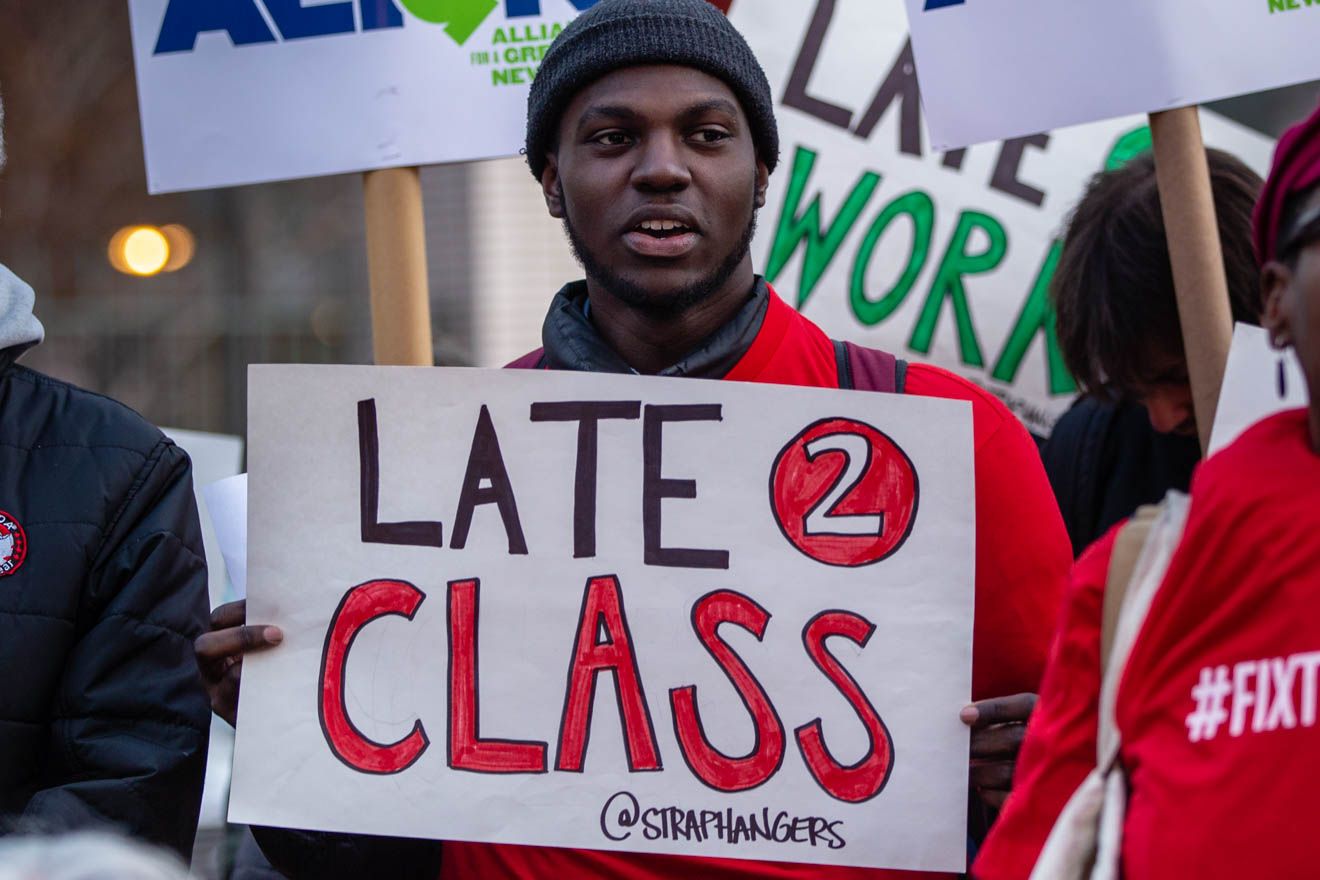
Others at the rally, as well as inside at the hearing, shared their own accounts of MTA problems. Mitchell White, a Riders Alliance member, said as an hourly employee, he loses money whenever he’s delayed from getting to work. “Every minute, every hour that I’m not at work, I’m not getting paid for that…. I can’t afford to be late for work any longer. I can’t afford a fare hike to pay for service that isn’t working for me. I’m calling on Governor Andrew Cuomo to please support congestion pricing and do not fix the subway on riders’ backs.”
“Don’t let the public transportation system hold students back. Fund the subway system,” pleaded a Medgar Evers student who said he was “speaking on behalf of every CUNY student who has ever been late for class, missed a test, or been reprimanded for being late to work because of the subway.”
“Our members reflect the 75% of low-income New Yorkers and New Yorkers of color who rely on MTA’s buses and the 66% who rely on their subways to get around the city,” said Renae Reynolds of NYC Environmental Justice Alliance, an organization that advocates for low-income neighborhoods and communities of color. “Today we are here to express our deep disapproval of the MTA’s proposal to hike fares again, where we see year after year consistent fare hikes have yielded nothing for transportation improvements in our communities.”
Inside the Kumble Theater, dozens more testified, voicing their opposition to the proposed fare increase to a panel of MTA board members and top executives including MTA NYC Transit President Andy Byford.
“Since I’ve been alive, which is not that long, the fare has been raised four times, each time by 25 more cents,” said a 16-year-old high school student. “Over the years, I noticed how the raise was affecting not only my mom as a single parent, but also everybody struggling with money,” she continued. “You will never understand the struggle that we go through as students and workers on the MTA buses and trains. Some people lose jobs and students lose class time because of the delays, but we don’t get that time back. I doubt that you use the MTA service yourselves because these issues would have already been resolved a long time ago,” she said. “Get your stuff together and show us that you’re going to use our money to better the crappy service that we get.”
“I would like to urge all of you to not approve the fare increase in the next year,” said Assembly Member Robert Carroll. “I know that it is imperative for the operating budget of the MTA to be fully funded, but you can do it another way, and the way in which you could do that is by engaging the state legislature.” Carroll said along with congestion pricing, a funding plan could include “other direct revenue streams” that could come from “an increase in a millionaire’s income tax, a tax on marijuana, a tax on sports betting,” among other tax sources.
“It is also necessary that when we create a congestion pricing scheme to de-incentivize people from driving into the central business district or using cabs,” the Assembly Member added. “We must further incentivize the use of mass transit and that is best done by keeping the fare as low as humanly possible.”
Anthony Drummond read a statement on behalf of Brooklyn Borough President Eric Adams. “This is the sixth time in eight years that the MTA is asking commuters who live in the most unaffordable city in America to dig deeply in their pockets and pay more to ride the buses and the trains. This particular fare and toll increase is especially egregious because MTA NYC Transit is not only calling for a fare and toll increase but also for service cuts to bus and subways. This is a slap in the face to New Yorkers who traverse the system on a daily basis and depend on reliable service for their livelihoods.”
Drummond expressed the Borough President’s “full support” of the Fast Forward Plan, Byford’s “ten-year plan to modernize the system,” and his recommendation for other city and state elected officials get behind it as well while exploring other “dedicated funding” options to finance the MTA along with congestion pricing and a millionaire’s tax. “We must stop asking commuters to pay more into the system that is becoming unaffordable and, right now, unreliable,” Adams’ statement concluded.
Those who signed up to testify at the public hearing voiced their opposition to the proposed fare hike and service cuts as well as their frustration with the lack of accessibility at many stations and other system problems. Some recommended getting rid of the entire MTA board and publicly electing a new one while others suggested incentives, such as free weekend rides, to restore faith in riders.
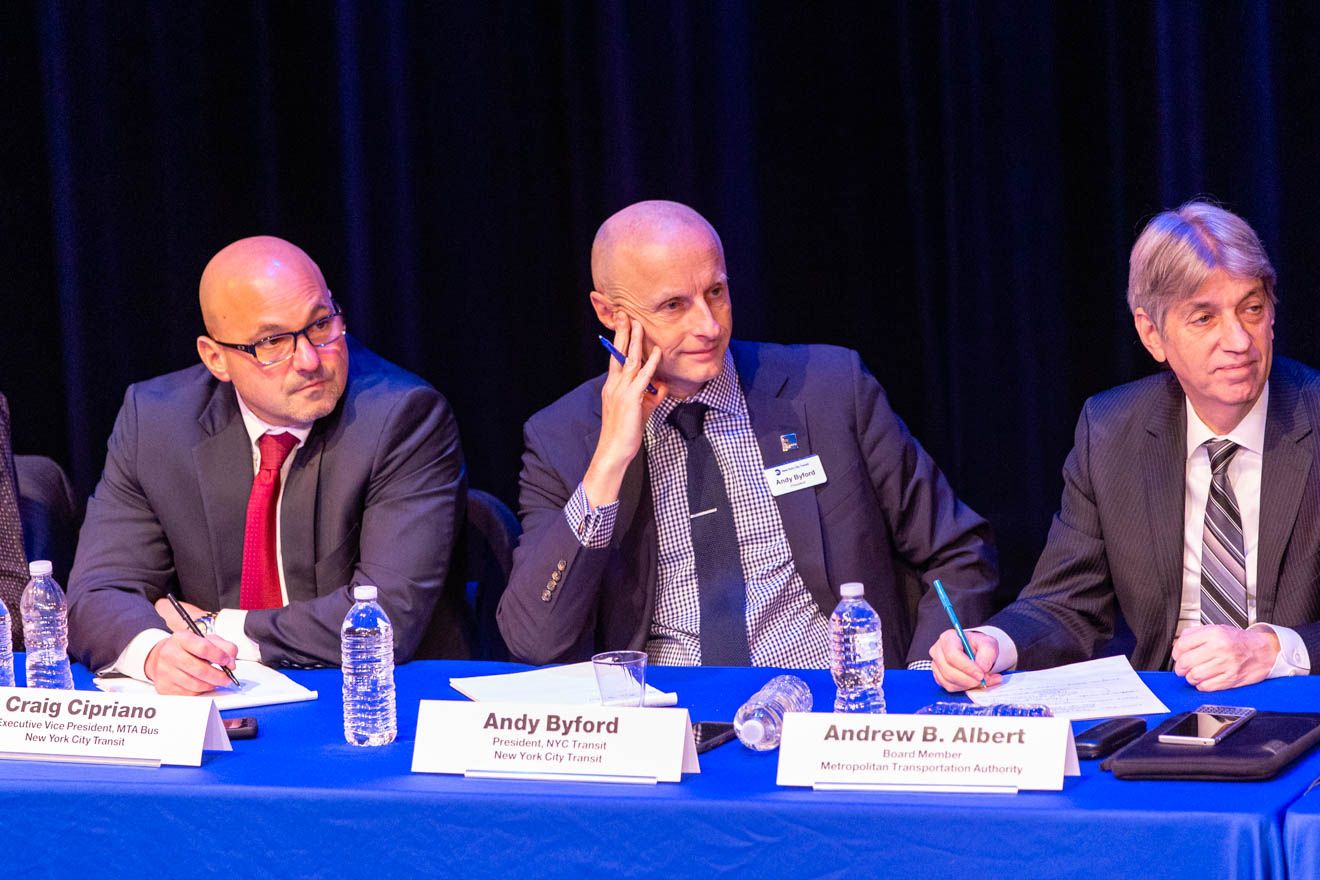
A handful of speakers agreed with Byford who has insisted that fare beaters are part of the MTA’s financial problems and that the NYPD should continue to punish them for jumping turnstiles.
“You know the reason why the fare hikes are going to take place?” asked one speaker. “This is the reason why—fare evasion. People nonchalantly walking through the gates. Some people think that it’s a race issue…. It’s not a race issue when I observe people wearing $200 Jordans, having $900 iPhones and going through the gates or through the back of the bus…while the rest of us working-class have to pay the full fare. It’s not fair for everybody,” he said. “Get after the fare evaders. Make them pay. Lock them up or give them summonses.”
Several in the audience disagreed with the speaker. Self-described “concerned citizen,” Joel, responded stating, “According to the MTA’s own statistics…fare beating costs $215 million. I think the capital budget and the operating budget was what, $17B or something, so I just want to give some perspective on the difference between a million and a billion. A million seconds is 12 days and a billion seconds is 31.7 years. $215 million is a drop in the bucket and basically blaming poor people for the rising fares is a way of criminalizing the poor even further.”
Joel then offered the MTA executives a counter proposal which you can see him discuss below.
Two more public hearings on the proposed fare hike will take place this week in Queens (December 11) and West of Hudson (December 13). The MTA will vote on the fare and toll hikes next month, with the proposed changes scheduled to go into effect in March 2019.
The MTA will continue to accept public comment until Thursday, December 13 online or via mail sent to: MTA Government Affairs, 2 Broadway, 20th Floor, New York, NY 10004.
[Videos by Nathan Haselby]




